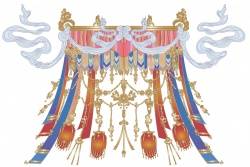Twenty-four-character Lotus Sutra
twenty-four-character Lotus Sutra
二十四文字の法華経 (Jpn nijuyo- moji-no-hokekyo )
Also, twenty-four-character teaching. Words with which Bodhisattva Never Disparaging praised the people he encountered.According to the "Never Disparaging" (twentieth) chapter of the Lotus Sutra, whenever this bodhisattva saw monks, nuns, laymen, or laywomen, he would bow to them in reverence, saying: "I have profound reverence for you, I would never dare treat you with disparagement or arrogance.Why? Because you are all practicing the bodhisattva way and are certain to attain Buddhahood." In Kumarajiva's Chinese translation of the sutra, this passage consists of twenty-four characters.
Although the people cursed and attacked Bodhisattva Never Disparaging with staves and stones, he continued to bow in reverence to them while uttering these words of praise and was eventually able to attain Buddhahood. Meanwhile, those who harassed him converted in the end, but because of their offense of persecuting him they fell into hell and stayed there for a thousand kalpas before once more encountering him and attaining Buddhahood. Nichiren, in a letter addressed to his followers in 1273 called On the Buddha's Prophecy, writes: "The twenty-four characters of Never Disparaging and the five characters of Nichiren are different in wording, but accord with the same principle. The end of the Buddha Awesome Sound King's Middle Day and the beginning of this Latter Day of the Law are exactly the same in method of conversion" (400). "Five characters" here refers to the phrase Myoho-renge-kyo, or Nam-myoho-renge-kyo, which Nichiren taught as the essence of the Lotus Sutra. Never Disparaging tried to awaken people to their own Buddha nature, but they rejected and attacked him on that account.
Nichiren saw a parallel between his own circumstances and those of Never Disparaging: In trying to awaken people to their inherent Buddhahood by teaching them the essence of the Lotus Sutra, or Nammyoho-renge-kyo, Nichiren, too, was scorned and attacked. Nevertheless, he was convinced that even those who attacked him would eventually attain Buddhahood through having formed a "reverse relationship" with the teaching he was spreading. According to the "Never Disparaging" chapter, even those who oppose the Lotus Sutra, though suffering due to their opposition, can eventually attain Buddhahood by virtue of the reverse relationship they have formed with that teaching. Elsewhere, Nichiren cited Never Disparaging's behavior as an example of the spirit with which one should practice the Lotus Sutra. In another letter written in 1277 he states: "The heart of the Buddha's lifetime of teachings is the Lotus Sutra, and the heart of the practice of the Lotus Sutra is found in the 'Never Disparaging' chapter. What does Bodhisattva Never Disparaging's profound respect for people signify? The purpose of the appearance in this world of Shakyamuni Buddha, the lord of teachings, lies in his behavior as a human being" (851-52). Because Never Disparaging's behavior toward others was crystallized in the teaching he shared and epitomizes the practice of the Lotus Sutra, it is called the "twenty-four-character Lotus Sutra."
